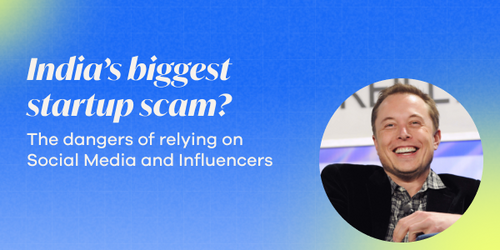India’s startup funding crisis has been a significant challenge for startups in the country for several years. However, the COVID-19 pandemic has made it worse, with many startups struggling to secure the funding they need to grow their businesses.
In this environment, a World Startup Convention event was promoted on social media, offering startups the chance to connect with investors and secure funding. The event claimed to be the "world's biggest funding festival ever," with the presence of 1,500 venture capitalists, 9,000 angel investors, and over 75,000 startups from around the world. It also claimed that Musk is invited (thereby implying that he may attend it too). Several well-known influencers endorsed the event, and the organizers promised a snazzy website and a professional and legitimate appearance. Startup founders paid up to ₹50 lakhs for sponsorships to attend the event, hoping to connect with investors and secure funding.
However, when the event took place, it turned out to be a scam. There were no major investors or venture capitalists present, and the event failed to deliver on its promises. Attendees were left feeling disappointed, cheated, and frustrated.
This incident highlights the risks associated with blindly trusting the promises made by event organizers and influencers on social media. Startups must conduct due diligence before investing time and money in such events, especially in the realm of startup funding. Startups must research event organizers and endorsers and evaluate their credibility before deciding to attend such events. Furthermore, influencers who promote fraudulent events should be held accountable for their actions.
The World Startup Convention scam may lead to legal action being taken against the organizers. Startups who attended the event and paid for sponsorships may have legal recourse to recover their funds. However, this process can be time-consuming and costly, and there is no guarantee of success. Startups should seek legal advice before pursuing legal action and consider all the costs and risks involved.
Moreover, organizers who mislead and defraud attendees may face legal consequences. Depending on the nature of the fraud, they may be subject to civil or criminal charges. In the case of the World Startup Convention, investigations are ongoing, and legal action may be taken against the organizers if they are found to have acted fraudulently.
Building a sustainable startup ecosystem in India requires long-term solutions such as stable government policies, robust funding mechanisms, and an entrepreneurial culture that supports innovation and growth. While events like the World Startup Convention may offer a temporary solution, they cannot replace the need for these fundamental solutions.
As always, it is crucial for startups to be vigilant and do their due diligence before investing their time and money in any event or opportunity. By staying informed and taking the necessary precautions, startups can protect themselves from scams and work towards building a thriving startup ecosystem in India.
In conclusion, the World Startup Convention scam serves as a cautionary tale for startups seeking funding opportunities in India. By taking the time to research and evaluate opportunities, startups can minimize their risk and maximize their chances of success. Legal action may be an option, but it is important to weigh the costs and risks involved. By staying informed and taking the necessary precautions, startups can protect themselves and build a thriving startup ecosystem in India.
Get Free Quote in Minutes

